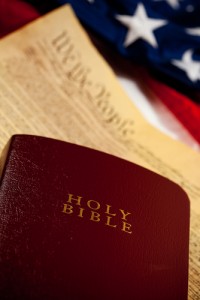 In the late 70’s, a political action organization called the Moral Majority was founded by Baptist pastor and Liberty University president, Jerry Falwell. “We’re fighting a holy war,” Falwell proclaimed to a large gathering at his Thomas Road Baptist Church in Lynchburg, Virginia in 1980. “What’s happened to America is that the wicked are bearing rule. We have to lead the nation back to the moral stance that made America great…we need to wield influence on those who govern us.”
In the late 70’s, a political action organization called the Moral Majority was founded by Baptist pastor and Liberty University president, Jerry Falwell. “We’re fighting a holy war,” Falwell proclaimed to a large gathering at his Thomas Road Baptist Church in Lynchburg, Virginia in 1980. “What’s happened to America is that the wicked are bearing rule. We have to lead the nation back to the moral stance that made America great…we need to wield influence on those who govern us.”
By the 1960’s, the sexual revolution had taken hold, soon followed in the seventies by Roe v. Wade and abortion on demand, the women’s liberation movement, and special rights for gays. Falwell and many others in evangelicalism’s leadership concluded it was time to band together and speak out against what they perceived as a degradation of American society fostered by those in political power.
The strategy of the Moral Majority was straightforward–lobby Congress to end abortion and reinstate school prayer, re-establish traditional gender roles for men and women, defeat the Equal Rights Amendment, curb special rights for gays, and promote “traditional family values.” The group broadened its focus to include support for a strong national defense and the free enterprise system. They sought to endorse and financially support candidates for political office who advanced their agenda.
Though tangible data is hard to produce, there is little doubt the Moral Majority lent a helping hand to conservative Ronald Reagan’s bid for the presidency in 1980 and his re-election in 1984. Their mobilization of the evangelical vote may have been an even more effective strategy in bringing a Republican majority to both the House and Senate.
As the 80’s progressed, the economy made a robust recovery, the Iron Curtain crumbled and fell, and the Equal Rights Amendment was tabled. The so-called progressive agenda offered by the politically liberal Carter administration of the late seventies was scuttled and all but halted in its tracks. In the minds of many evangelicals, God had not only sanctioned the Moral Majority to carry out His plan, He was now blessing America with a kind of cultural counter-revolution. Announcing the disbandment of the Moral Majority in 1989, Falwell declared, “Our goal has been achieved…The religious right is solidly in place…religious conservatives in America are now in for the duration.”
Fast forward twenty-six years, and where is the influence of the Moral Majority or the “religious right”? Not only were most of their goals ultimately unachieved, but where is, as Pastor John MacArthur asks, “…the collective Christian consensus wielding any significant power in this country?”
As the 80’s gave way to the 90’s and the new millennium, it became apparent that the “religious right” was not “solidly in place.” The loose coalition between cultural Christianity and true believers was no match for the post-Christian mindset in the battle for political supremacy. Shortly after the SCOTUS 5-4 decision mandating same-sex marriage on June 26th, a radio talk-show caller facetiously blurted, “I’m sure Jerry Falwell just turned over in his grave.”
It must be left to the social scientists to speculate and debate as to the dates, times or reasons for the dissolution of what many refer to as the Christian era in the United States. Suffice it to say, we can accept Southern Baptist Theological Seminary President Albert Mohler’s succinct description of the progression when he declares, “The American culture has regressed from one profoundly influenced by Christian thought to one dominated by secularist thought.”
Russell Moore, president of the Southern Baptist Ethics and Religious Liberty Commission says, “Evangelicals need to recognize that their values no longer define mainstream American culture.” Al Mohler goes even further when he states, “The American culture has not just shifted, it has been turned on its head. What was once considered immoral in our society is now considered moral. Those who don’t toe the line to the new morality are not just marginalized, they are chastised.”
If new government mandated rules of moral conduct now place believers at enmity with the majority, how do American Christians move forward in a culture hostile to them? After all, isn’t every citizen by fiat given the “right to life, liberty and the pursuit of happiness” (per the Declaration of Independence)? Isn’t the government to be “by the people and for the people” (from President Abraham Lincoln’s Gettysburg Address)?
Next time: How does the church engage the culture if it doesn’t adopt the Moral Majority model?

